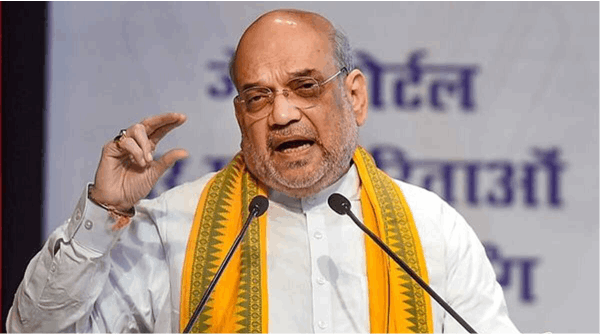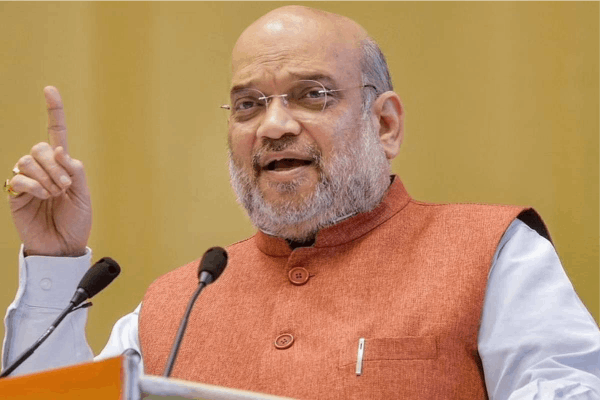Amit Shah: Biography, Age, Son, Wife, Net Worth, Cast
Amit Shah, a member of the Lok Sabha representing Gandhi Nagar, is the Minister of Home Affairs and the Minister for Cooperation. From 2014 to 2020, he served as the B.J.P.'s president. Since 2014, he has served as the National Democratic Alliance's chairman. He has an extensive political background. From 2002 to 2012, he served as a minister in the Gujrat government before becoming a cabinet member. In the wake of the B.J.P.'s resounding victory in the 2019 general elections, he was appointed Minister in the Center. He is known as the "Chanakya" of elections. He played a crucial role in B.J.P.'s victory in Gujrat. Before this, he was elected from Gujrat to the Rajya Sabha in 2017.

Body Measurements and Physical Data
- Weight: 198 lbs; 90 Kg.
- Height: 5'6" in feet and inches; 1.68 m in meters; 168 cm in centimetres.
- Color of Hair: White
- Color of Eyes: Black
Favorites
- Political Favorite: Narendra Modi
- Food Preference: Poha

Early Life and Family
He was conceived on October 22, 1964, in Mumbai. He is of Hindu descent. His father, Anil Chandra Shah, was a businessman from Mansa who ran a family-owned P.V.C. pipe company. He attended Mehsana for his formal education and received his biochemistry degree from CU Shah Science College. Later, he also contributed to his father's company. He had dabbled in the brokerage and cooperatives bank industries in Ahmedabad.
Shah belonged to ABVP, a Rashtriya Swayamsevak Sangh student organization during college. An outgrowth of the Bhartiya Janta Party is the ABVP. He first worked for the ABVP before switching to the Bhartiya Janta Party in 1987. He was elected to the M.L.A. in 1997 due to a by-election. He remained an M.L.A. until 2007 from Sarkhej. In 2008, he was subsequently elected from the Naranpura seat. He served as the then-chief minister's close aide and held several ministries in the Modi administration from 2002 to 2012.
His standing in the Party has increased. To win the General Lok Sabha Elections, he was handed responsibility for Uttar Pradesh, a delicate and crucial state politically. He played a key role in winning 73 out of 80 Lok Sabha seats, ensuring victory. He was, after that, awarded the position of B.J.P. president. Following his election as president, B.J.P. won many legislative elections in Assam, Jharkhand, Jammu and Kashmir, Maharashtra, and Haryana.
Losing the 2015 Assembly elections in Bihar and Delhi also resulted in several setbacks. Shah's Party gained states like Uttar Pradesh, Uttarakhand, Gujrat, and Manipur during his presidency, and there were many other triumphs. The biggest win came in the 2019 General Election when the B.J.P. won an astounding 303 seats to take power at the Centre.
He joined nearby Shakhas after becoming a lifelong member of the Rashtriya Swayamsevak Sangh. Through Sangh Programs, he met Narendra Modi in 1982. Modi oversaw Pracharak at the time and spread Sangh's philosophy. He became a member of the ABVP as a student leader, which was his first step into politics. He began as an activist in the B.J.P. Yuva Morcha and worked his way up to the positions of ward secretary, taluka secretary, state secretary, vice president, and general secretary. He was well recognized for his organizational prowess and ran the LK Advani Lok Sabha Seat's campaign.
In 1995, Gujarat got its first non-Congress administration. The State's non-Congress Chief Minister is B.J.P. member Keshubhai Patel. In rural Gujrat, the Indian National Congress was well-represented. Both Shah and Modi took action to reduce the prevalence of I.N.C. in rural Gujarat. He gave rural local leaders more influence and persuaded them to join B.J.P. 8000 local leaders joined the B.J.P through this program.
The same tactic was applied in cooperatives to lessen the influence of Congress. Cooperatives significantly influence the Gujrat economy. Shah was appointed president of the Ahmedabad District Cooperative Bank after causing Congress insomnia. Caste played a significant role in the election; at the time, the Patels, Kshatriyas, and Gaderias were dominant castes. Shah didn't fit any of these categories but won the election. The bank was in poor shape, lost Rs 36 crores, and was about to fail, but Shah changed the situation in a year, and the bank produced a profit of Rs 27 crores.
He also mandated that the majority of the board members be B.J.P. supporters. Therefore, 11 of the 22 directors were committed to the B.J.P. They shifted their attention to sports organizations, which Congress heavily controlled then.
Early in the 1990s, Modi was appointed general secretary of the B.J.P. Gujarat. He utilized his influence to secure Amit Shah in a key position. Modi requested Patel nominate Shah for the position. Hence Shah became the Gujrat State Financial Corporation. Gujrat's Chief Minister was Keshu Bhai Patel. Senior party officials like Shankarsinh Vaghela and others raised concerns with central party leadership about Modi leveraging his power in the administration as they observed his growing influence within the Party. As a result, the leadership relocated Modi to the B.J.P. headquarters in Delhi.
Amit Shah served as Modi's close aide at the time. In a by-election in Sarkhej, Shah received Assembly seats thanks to Modi's connections in Delhi. Shah won the seat in the 1997 legislative election and increased his margin of victory in successive assembly elections.
When Keshubhai faced major inefficiency allegations, he was forced to quit as Chief Minister. Patel was succeeded as Chief Minister of Gujarat by Narendra Modi. Shah ran for office from the Sarkhej seat in 2002 and won by a wide margin; later, he ran again from the Sarkhej seat and increased his margin of victory.
Shah was formerly considered the Gujrat's most powerful individual under Modi's administration. Having been given 12 Ministries, he was the youngest member of the Cabinet. The administration announced that it would repeal the Prevention of Terrorism Act. Then, despite an opposition walkout from the Assembly, Shah introduced another law called Gujrat Control of Organized Crime. Shah convinced Modi to approve the Anti-Conversion Bill, which also pushed for strict religious conversion guidelines.
Game-Changing Situation
Shah's career began to deteriorate after his arrest in 2010. He made a great political comeback, winning handily in the 2014 Uttar Pradesh General Elections. His responsibility was the Lok Sabha seats in Uttar Pradesh. 73 of the 80 seats were won by his Party. On June 12, 2013, he received UP. He spent a lot of time in Uttar Pradesh trying to comprehend the advantages and disadvantages of the Samajwadi Party. He felt that despite S.P.'s victory in the poll, he had broken his pledge. He capitalized on the voters' existing dissatisfaction by raising these topics. One of the factors is a reservation, and Shah tried to glean this delicate subject.
Shah participated in all UP-related activities, including the candidate selection process. He established a specialized team to administer the Lok Sabha elections in UP, and this team is responsible for overseeing every detail of the election. He held campaigns in all of the Lok Sabha constituencies except for a handful. He engaged the people by organizing large-scale Rath Yatras. He interacted with the locals while exploring every nook and cranny of the UP. He convinced Modi to contest the election from Varanasi, but in 2014, Modi ran for two Lok Sabha seats: Vadodra and Varanasi. He also got local leaders interested in getting people to the rally site. Outside of the UP, he also significantly impacted relationships with other regional parties.
Amit Shah was chosen as the B.J.P. President by the B.J.P. Central Parliamentary Board in July 2014 and won a unanimous vote. Shah was then unanimously elected president again in 2016. He started a membership drive to broaden his Party's support and ideological base. His Party won landslides in Uttar Pradesh, Maharashtra, Haryana, Jammu & Kashmir, Jharkhand, and Assam when he was the B.J.P. leader. Losing the assembly elections in Delhi and Bihar was another setback.
In 1995, B.J.P. retook control of Gujrat as well. In the 2019 Lok Sabha election, Shah set a lofty goal for his Party's members to win more than 300 seats. He altered the nation's political climate. As a result, he became one of India's most effective presidents. He was said to as the "Chanakya" of today. Chanakya was the historical figure who brought Chandragupta Maurya to power in place of the Nanda Dynasty.